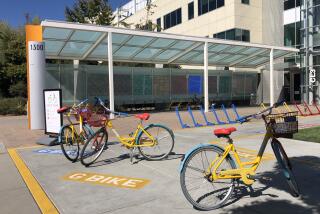A Temporary Setback : Mainstream Struggles as Aerospace Worker Market Shrinks
- Share via
Three years ago, H. Robert Kingston boasted he was going to make his small company a lot bigger.
Kingston, 65, is president of Mainstream Engineering in Encino, a firm that provides aerospace and defense companies with temporary technicians and engineers. It’s more Rosie the Riveter than Kelly Girl, but the idea is the same: supplying temporary personnel.
Back in the summer of 1985, Kingston said Mainstream was on the verge of an expansion push--it would open offices outside of California and start supplying temporary personnel in non-technical areas where the opportunities for profit are greater.
As it turned out, there wasn’t any expansion. Looking back, Mainstream was really on the verge of going downhill, not up. For the eleven months ended March 31, 1987--the latest financial results available--Mainstream’s sales dropped 17.7% to $22.8 million while its profits tumbled 32% to $320,206, compared to the same period a year earlier. (Mainstream doesn’t file quarterly results because 81% of the company is owned by Raycomm Transworld Industries in Freehold, N.J.)
What went wrong? The competition heated up. The National Technical Services Assn., a trade group in Washington, says there are at least 1,000 companies supplying technical personnel with combined sales of more than $3 billion, up from 800 competitors three years ago.
And nowhere is the competition tougher, say analysts, than in the struggling aerospace industry, which makes up more than half of Mainstream’s business. Other temporary personnel firms have been undercutting one another to win contracts with aerospace giants like TRW and Rockwell, which used to hire large numbers of technical temps. The result: a price war as more companies vie for fewer orders. While Mainstream has held the line on prices, Kingston said, it has also lost some business.
“The aerospace market is the biggest part of the technical market and it’s very competitive,” said Jeffrey Berg, an analyst with the St. Petersburg, Fla.-based brokerage of Raymond, James & Assoc. Profit margins in the temporary tech industry are notoriously low. Mainstream makes less than 2 cents in profit for every dollar in sales. “Nobody is going to get rich in the aerospace market,” Berg said.
Not surprisingly, Mainstream’s stock has languished, and closed Monday at $6 bid per share on the thinly traded “pink sheets” over-the-counter market, only $1.25 above its original offering price seven years ago.
“We’re in a low period right now,” Kingston admitted.
As of March, 1987, Mainstream had virtually no debt on its books but it also had only $375,000 in cash. And with Mainstream’s eroding results, Kingston couldn’t afford to finance his numerous expansion plans.
Kingston, for example, had wanted to diversify away from aerospace and engineering and get into temporary day-care personnel. “The day-care services went by the wayside,” said Kingston. He blames that failure on skyrocketing insurance rates for day-care facilities.
There was a plan to open an office with drafting and computer-aided-design (CAD) equipment to do technical work in-house. “Again that was put on the back burner,” Kingston said.
Then, there was the idea of expanding beyond California and the company’s offices in San Diego, Costa Mesa, Encino and Santa Clara. Kingston had planned to open a Phoenix branch in September of 1985. It never did. “I was a little disappointed,” Kingston said.
Effect of Layoffs
The slump in the local aerospace industry didn’t help Mainstream. Because of several completed programs--including the B-1 Bomber--the aerospace companies have cut costs and personnel, including temporary workers. “When a company lays off people, they lay off some of our people, too,” Kingston said. Some 68% of Mainstream’s revenue comes from temps assigned to government-related projects.
TRW in Redondo Beach, for example, laid off 1,300 workers starting in February. Before then, Mainstream had 70 temps with the company. Now it only has 29.
Overall, Mainstream has about 700 temps working at the moment, but the number varies every month. Temps work anywhere from a day to more than a year and earn from $6 to $150 an hour, depending on their skills.
To keep clients, some temporary tech firms have slashed their markups--that is what, say, TRW pays Mainstream for an employee’s work and what Mainstream in turn pays the employee. (Mainstream keeps the difference.)
Kingston--who refused to disclose the average markup Mainstream charges--said only in the rarest cases has the company cut its markup, and so it has lost some business.
Raycomm Losses
Another problem for Mainstream is that its parent company, Raycomm, is in even worse financial shape. For the year that ended March 31, 1987, Raycomm lost $2.8 million on $60.7 million in sales. Raycomm’s accountants qualified their audit and said “the company’s ability to continue in existence is dependent upon its ability to obtain new financing and to attain future profitable operations.”
Mainstream was founded in 1971 by Joe Davis, who had been a partner with Kingston in a Sherman Oaks-based temporary technical firm called VIP Engineering Co. VIP was sold to the Philadelphia-based CDI Corp., one of the nation’s biggest temporary technical firms, in 1968.
Both men went to work for CDI, but Davis eventually retired and started Mainstream. Raycomm got controlling interest of Mainstream in 1978, Davis retired in 1979 and Kingston took over. Kingston, who is now paid $200,000 a year, was asked what would happen to Mainstream should Raycomm collapse. “God, don’t even say that,” he said. He has complete confidence that Raycomm will work out its problems, he added.
Raycomm also owns LPL Technical Services, another temporary technical personnel firm based in Los Angeles. Why not combine Mainstream and LPL and cut overhead expenses? “I imagine that would be in the offing eventually,” Kingston said.
In the meantime, Kingston is going back to the drawing board. He figures he will open the Phoenix office this fall, three years behind schedule. “We have a business plan in place to have 10 offices in 10 years,” Kingston said.
His stockholders can only hope he’s right.
More to Read
Inside the business of entertainment
The Wide Shot brings you news, analysis and insights on everything from streaming wars to production — and what it all means for the future.
You may occasionally receive promotional content from the Los Angeles Times.










